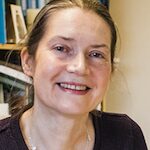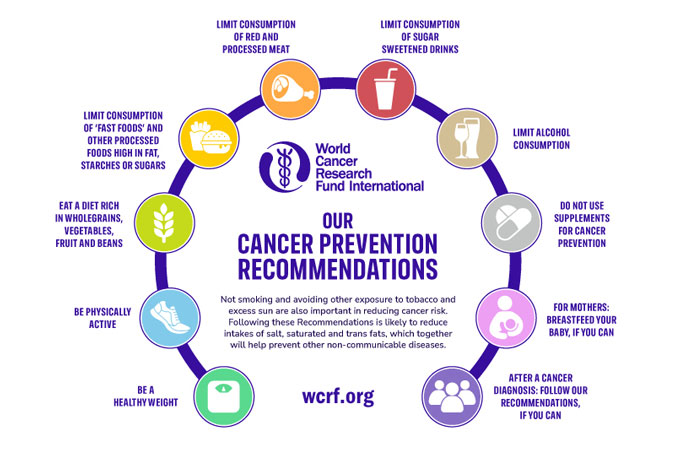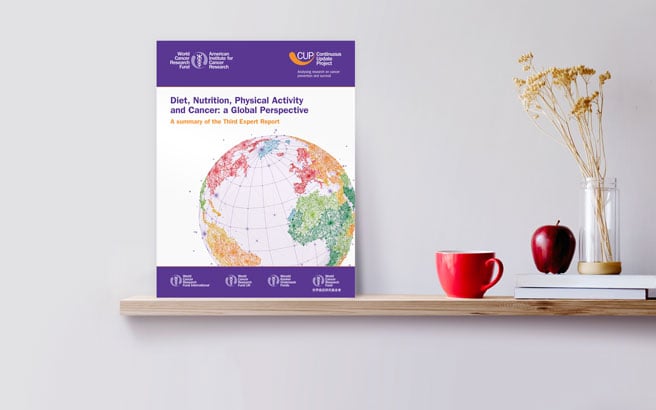 Kate Allen is World Cancer Research Fund (WCRF) International’s Executive Director of Science & Public Affairs.
Kate Allen is World Cancer Research Fund (WCRF) International’s Executive Director of Science & Public Affairs.
Today, 24 May 2018, we launch our new report – Diet, Nutrition, Physical Activity and Cancer: a Global Perspective – the result of an ongoing review of decades of evidence by world-renowned, independent experts from across the globe. The report highlights the critical role that overweight and obesity – fuelled by lifestyles featuring little exercise and lots of ‘fast’ and processed food – play in cancer development.
Our new report shows that the evidence has strengthened in the years since our last report in 2007, with 12 cancers now linked to weight. For this reason, the recommendation to be a healthy weight is number one in the updated Cancer Prevention Recommendations, which form the centrepiece of the report.
Our updated Recommendations
The Recommendations work together as an overall way of living healthily to prevent cancer. As well as the Recommendation on weight itself, there are two Recommendations that promote positive changes you can make to reduce both the risk of cancer and weight gain, overweight and obesity:
- Be physically active, which can help protect you from three cancers and from being overweight or obese. That doesn’t mean rushing off to the gym every day! Examples of physical activity I do regularly include walking, household chores, gardening and dancing. The more active you are, the greater the benefit.
- Eat a diet rich in wholegrains, vegetables, fruit and beans, as dietary patterns that are linked to a lower risk of cancer consistently feature high consumption of these foods.

The next four Recommendations focus on what to limit to reduce the risk of cancer, or of weight gain, overweight and obesity:
- Limit consumption of ‘fast foods’, red and processed meat, sugar-sweetened drinks and alcohol, because fast food and sugar-sweetened drinks fuel overweight and obesity, red and processed meats are linked with colorectal cancer and alcohol is a cause of six different types of cancer.
The next Recommendation relates to supplements:
- Do not use supplements for cancer prevention, aiming instead to get everything you need from your diet.
Finally, two special Recommendations relate to specific groups:
- For mothers: breastfeed your baby, if you can, because it helps protect mothers from breast cancer and babies from being overweight or obese in later life.
- After a cancer diagnosis: follow our Recommendations, because there is growing evidence that lifestyle factors such as increased body fatness and low levels of physical activity affect women’s chances of survival after a diagnosis of breast cancer and likely other cancers too.
These Recommendations are similar to those in our 2007 report, but they incorporate an important shift in emphasis. It’s unlikely that there are ‘magic bullet’ specific foods or nutrients that in themselves cause or protect against cancer. Rather, different patterns of diet and physical activity combine to create a metabolic state that makes you more or less susceptible to cancer. That’s why the Cancer Prevention Recommendations work together as a blueprint to beat cancer and they’re very securely based on evidence that’s now been consistent for decades.
Launching the new report
Today colleagues and I are at the Royal Society in Central London sharing findings from our new report with leading researchers, policymakers and opinion formers. We’ll also be at the European Congress on Obesity in Vienna and the World Health Assembly at Geneva presenting the report, and we’ll be having national launches in the US and the Netherlands. Look out for us on social media and help share the message that cancer can be prevented.


